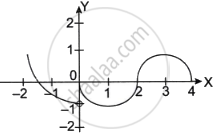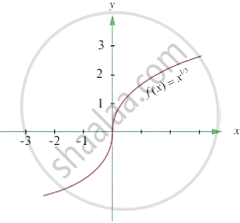Advertisements
Advertisements
Question
Find the points of discontinuity, if any, of the following functions: \[f\left( x \right) = \begin{cases}2x , & \text{ if } & x < 0 \\ 0 , & \text{ if } & 0 \leq x \leq 1 \\ 4x , & \text{ if } & x > 1\end{cases}\]
Solution
The given function is \[f\left( x \right) = \begin{cases}2x , & \text{ if } & x < 0 \\ 0 , & \text{ if } & 0 \leq x \leq 1 \\ 4x , & \text{ if } & x > 1\end{cases}\]
The given function is defined at all points of the real line.
Let c be a point on the real line.
Case I:
` "If "c < 0, " then " f(c)=2c`
`lim_(x->c)=lim_(x->c)(c)=2c`
`∴lim_(N->oo)f(x)=f(c)`
Therefore, f is continuous at all points x, such that x < 0
Case II:
` " If " (0), " then " f(c)=f(0)=0`
The left hand limit of f at x = 0 is,
`lim_(x->0)f(x)=lim_(x->0)(2x)=2xx0=0`
The right hand limit of f at x = 0 is,
`lim_(x->0)f(x)=lim_(x->0)(0)=0`
`∴lim_(x->0)(x)=f(0)`
Therefore, f is continuous at x = 0
Case III:
` " If " 0 < c< 1 " then " f(x) " and " lim_(x->c) f(x)=lim_(x->c)(0)=0`
`∴ lim_(x->c)f(x)=f(c)`
Therefore, f is continuous at all points of the interval (0, 1).
Case IV:
` " If "c=1 " then " f(c)=f(1)=0`
The left hand limit of f at x = 1 is,
`lim_(x->1)f(x)= lim_(x->1)f(1)=0`
The right hand limit of f at x = 1 is,
`lim_(x->1)f(x)=lim_(x->1)(4x)=4xx1=4`
It is observed that the left and right hand limits of f at x = 1 do not coincide.
Therefore, f is not continuous at x = 1
Case V:
` " If " c <, " then " f(c)=4c " and " lim_(x->c)f(4x)=4c`
`∴ lim_(x->c)f(x)=f(c)`
Therefore, f is continuous at all points x, such that x > 1
Hence, f is not continuous only at x = 1
APPEARS IN
RELATED QUESTIONS
Find the values of p and q for which
f(x) = `{((1-sin^3x)/(3cos^2x),`
is continuous at x = π/2.
Prove that the function f (x) = 5x – 3 is continuous at x = 0, at x = – 3 and at x = 5.
Is the function f defined by f(x)= `{(x, if x<=1),(5, if x > 1):}` continuous at x = 0? At x = 1? At x = 2?
Find all points of discontinuity of f, where f is defined by `f(x) = {(|x|+3, if x<= -3),(-2x, if -3 < x < 3),(6x + 2, if x >= 3):}`
Find all points of discontinuity of f, where f is defined by `f (x) = {(x/|x|, if x<0),(-1, if x >= 0):}`
Find all points of discontinuity of f, where f is defined by `f(x) = {(x^3 - 3, if x <= 2),(x^2 + 1, if x > 2):}`
Is the function defined by `f(x) = {(x+5, if x <= 1),(x -5, if x > 1):}` a continuous function?
Show that the function defined by g(x) = x = [x] is discontinuous at all integral points. Here [x] denotes the greatest integer less than or equal to x.
Examine the continuity of f, where f is defined by `f(x) = {(sin x - cos x, if x != 0),(-1, "," if x = 0):}`
Find all the points of discontinuity of f defined by `f(x) = |x| - |x + 1|`.
Determine the value of the constant 'k' so that function f(x) `{((kx)/|x|, ","if x < 0),(3"," , if x >= 0):}` is continuous at x = 0
Find the value of constant ‘k’ so that the function f (x) defined as
f(x) = `{((x^2 -2x-3)/(x+1), x != -1),(k, x != -1):}`
is continous at x = -1
Show that the function f(x) = `{(x^2, x<=1),(1/2, x>1):}` is continuous at x = 1 but not differentiable.
Find the points of discontinuity, if any, of the following functions: \[f\left( x \right) = \begin{cases}x^{10} - 1, & \text{ if } x \leq 1 \\ x^2 , & \text{ if } x > 1\end{cases}\]
The function f (x) = tan x is discontinuous on the set
Show that the function `f(x) = |x-4|, x ∈ R` is continuous, but not diffrent at x = 4.
Prove that `1/2 "cos"^(-1) ((1-"x")/(1+"x")) = "tan"^-1 sqrt"x"`
If f(x) = `{{:("a"x + 1, "if" x ≥ 1),(x + 2, "if" x < 1):}` is continuous, then a should be equal to ______.
Find all points of discontinuity of the function f(t) = `1/("t"^2 + "t" - 2)`, where t = `1/(x - 1)`
`lim_("x" -> pi/2)` [sinx] is equal to ____________.
The number of discontinuous functions y(x) on [-2, 2] satisfying x2 + y2 = 4 is ____________.
The function `f(x) = (x^2 - 25)/(x + 5)` is continuous at x =
`f(x) = {{:(x^3 - 3",", if x < 2),(x^2 + 1",", if x > 2):}` has how many point of discontinuity
`f(x) = {{:(x^10 - 1",", if x ≤ 1),(x^2",", if x > 1):}` is discontinuous at
If function f(x) = `{{:((asinx + btanx - 3x)/x^3,",", x ≠ 0),(0,",", x = 0):}` is continuous at x = 0 then (a2 + b2) is equal to ______.
If f(x) = `{{:(cos ((π(sqrt(1 + x) - 1))/x)/x,",", x ≠ 0),(π/k,",", x = 0):}`
is continuous at x = 0, then k2 is equal to ______.
Let α ∈ R be such that the function
f(x) = `{{:((cos^-1(1 - {x}^2)sin^-1(1 - {x}))/({x} - {x}^3)",", x ≠ 0),(α",", x = 0):}`
is continuous at x = 0, where {x} = x – [x], [x] is the greatest integer less than or equal to x.
Find the value(s) of 'λ' if the function
f(x) = `{{:((sin^2 λx)/x^2",", if x ≠ 0 "is continuous at" x = 0.),(1",", if x = 0):}`
Find the value of k for which the function f given as
f(x) =`{{:((1 - cosx)/(2x^2)",", if x ≠ 0),( k",", if x = 0 ):}`
is continuous at x = 0.
If f(x) = `{{:((kx)/|x|"," if x < 0),( 3"," if x ≥ 0):}` is continuous at x = 0, then the value of k is ______.
The graph of the function f is shown below.

Of the following options, at what values of x is the function f NOT differentiable?
Consider the graph `y = x^(1/3)`

Statement 1: The above graph is continuous at x = 0
Statement 2: The above graph is differentiable at x = 0
Which of the following is correct?
